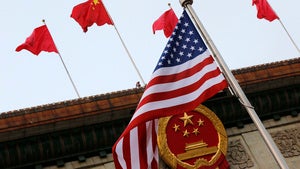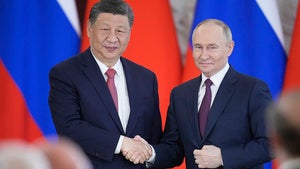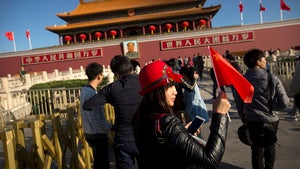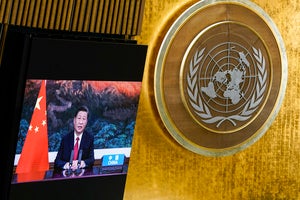Whether Beijing should take any leadership position on the world stage, however, is an overwhelming “yes.”
New research conducted by the Chicago Council on Global Affairs and The Carter Center offers a rare window into the attitudes of everyday Chinese citizens’ on international affairs. The survey, conducted April 25 to June 16, 2025, reveals a Chinese public confident about its country’s status as a global power, and the interest of everyday Chinese citizens in their country’s continued global involvement is striking, given the opposite trend in recent surveys of American public opinion. At least on these issues, the results reveal a public that looks likely to support Beijing’s aspirations to shape global power dynamics in China’s favor.
There are numerous challenges in conducting surveys in China, including designing a representative sample, a closed media environment, and the potential for self-censorship. While treating these results with a degree of skepticism is healthy, previous and repeated surveys conducted by other organizations have found similar patterns among Chinese public opinion on international issues.
Key Findings
- Nine in 10 Chinese support their country’s active participation in world affairs (90%).
- Part of this enthusiasm stems from a sense that China is a leading power in the world: Large majorities say their country is in at least a somewhat strong position in the world (97%) and expect it to get at least somewhat stronger in the next five years (95%).
- Seven in 10 Chinese respondents say China has a unique character that makes it the greatest country in the world (69%) versus three in 10 who say China is no greater than any other country (30%).
- While a plurality prefer China play a shared leadership role in the world (48%), four in 10 say it should take a dominant one (41%). One in 10 feel China should play no leadership role (11%).
Chinese Public Backs Xi’s Nationalist Ambitions
This Chicago Council survey focused solely on foreign policy issues to minimize any sensitivities around domestic politics. One common theme that emerges from these studies is that nationalism is alive and well in China (and apparently has been for some time), in sync with messaging from Chinese leadership. In a party conference speech marking the end of Chinese President Xi Jinping’s first term in office in 2017, Xi proclaimed “the Chinese nation . . . has stood up, grown rich, and become strong—and it now embraces the brilliant prospects of rejuvenation. . . . It will be an era that sees China moving closer to center stage and making greater contributions to mankind.” These Chicago Council survey findings illustrate that Xi has widespread public backing for these aspirations.
Nine in 10 Chinese Support an Active Role for China on the World Stage
When asked whether they support or oppose an active role for China in world affairs, the percentage of Chinese respondents who support active global participation is striking. Nine in 10 Chinese say it is best for China’s future if their country takes an active part in world affairs (90%). This is a remarkable proportion compared to American public opinion on this question. Over the past 50 years of Chicago Council Surveys, the highest percentage of Americans who supported an active part in world affairs for the United States was 71 percent, recorded in 2002, after the September 11 attacks. By contrast, in the 2024 Chicago Council Survey, just 56 percent of Americans preferred an active US global role in world affairs, one of the lowest levels on record.
The view that China should take an active global role is held widely across Chinese of all ages, education levels, and income categories. Those Chinese with less than a high school education are the most likely to favor staying out of world affairs (20%), but three in four (75%) still favor an active part for China.
Military, Economy, and Technology Contribute to China’s Influence
Part of this enthusiasm stems from a sense that China is a leading power in the world. Its rapid economic development since the 1980s has expanded the country’s technological independence and global footprint—particularly through trade partnerships and development assistance programs, like the Belt and Road Initiative. Beijing has also become influential in international organizations like the United Nations, the World Bank, and BRICS.
In fact, almost all Chinese (97%) say their country is in a strong overall position in the world (43% very strong, 54% somewhat) and think China will only enhance its position over the next five years (95%; 46% grow much stronger, 49% somewhat stronger). Only a handful see China’s current position as weak (3%) and getting weaker in five years (4%).
When asked what has made China so influential, the Chinese people point mostly to their country’s military strength (79% very important), technology and innovation (76%), and economic power (73%) as the most important reasons their country is so influential today.
Two-thirds also believe Chinese culture is very important to national influence (66%). While many consider China’s economic assistance to other countries as important to Chinese global influence, they tend to view it as somewhat important (45%) rather than very important (37%).1
Public Perceptions of Economy Affect Views of Beijing’s Influence
Chinese economic gains appear to be a factor in these views. While only a minority of the overall Chinese public say economic conditions are very good (21%, compared to 63% somewhat good), this group is much more likely than others to say the country’s global position is very strong (71% compared to 43% overall) (see appendix table 1).
In addition, respondents’ economic assessments also influence the extent to which other factors play a role in their assessments of Chinese influence. For example, at least nine in 10 Chinese citizens who rate China’s economic situation as very good believe China’s military strength, technology and innovation, and economic power are all important elements in China’s clout. But these majorities decline with each downward increment in perceptions of the economy’s condition. At the other extreme, those who rate the economy as very bad are least likely to consider these factors important (though a majority of even this group consider China’s military strength to be an important factor).
Chinese Public Internalizes Idea of Chinese Exceptionalism
Chinese leaders have passed on their own versions of Chinese “exceptionalism” that underscore China’s unique characteristics that differentiate it from Western nations. Given this type of messaging from leaders along with the public’s expressions of confidence in China’s international standing, the Chinese people are not shy about their country’s achievements. Seven in 10 Chinese say their country has a unique character that makes it the greatest country in the world (69%) versus three in 10 who say it is no greater than other nations (30%). Belief in China’s exceptionalism is especially prevalent among older age groups, though a majority of the youngest Chinese cohort also say China is the greatest. In addition, an even larger majority of those who think the Chinese economy is very good say China is the greatest (83%).
Plurality Prefer Shared Global Leadership, but Many Prefer Chinese Dominance
China has effectively marshaled forces within some of the international institutions and agreements created and legitimated by the United States, such as the World Bank and the United Nations, and has wielded its veto power to temper the influence of the United States and its Western allies. When Beijing disagrees with some of the norms of organizations within the current international system (such as on human rights), it has sought to create alternative models and organizations that push for more multipolar governance structures.
The Chinese public seems to be of two minds on whether China should share global leadership or try to dominate the international stage. While a plurality prefers their country to play a shared leadership role in the world (48%), a sizable four in 10 say it should take a dominant one (41%). One in 10 feel China should have no leadership role (11%).
Unlike many other issues, when it comes to China’s leadership role in the world, the public shows more notable divisions along demographic lines. For one, women (45%) are more likely than men (38%) to prefer a dominant role for China. Older Chinese are also more likely to favor a dominant role for China, while those 18 to 29 are the strongest proponents of shared leadership. And those Chinese with at least a college degree are notably more inclined to favor a shared (57%) rather than dominant (35%) leadership role for China.
Chinese View UN Participation as Important, Favor Working through United Nations
One way China is already playing a shared leadership role is by participating in the United Nations, where its permanent seat on the UN Security Council and veto powers also give Beijing significant influence. Chinese involvement accelerated when the country started globalizing in the 1990s. Beijing’s influence in the United Nations has increased substantially as China has attained key leadership positions in various UN agencies, increased the number of Chinese nationals working in the UN framework, and boosted financial contributions to UN programs. This has given China more sway in influencing global standards and practices in ways that reflect its economic and political interests.
These gains have not been lost on the public: Two in three Chinese believe their country’s participation in the United Nations has been very important for influencing global policies (68%), while 28 percent say it has been somewhat important. And the Chinese do not seem to think global problems need to always be decided solely on Chinese terms: A solid majority agree China should be more willing to make decisions on global problems within the UN framework even if it means China will sometimes have to compromise on policies that aren’t its first choice (77%). Just 23 percent disagree.
This dovetails with findings from survey conducted by China’s Tsinghua University in April 2024 that shows that Chinese are divided over how China should address disagreements between it and other countries. That survey found that four in 10 think China should rely on China’s own strength to resolve such disagreements (42%), compared to a third who prefer to rely on multilateral institutions like the United Nations and international law (33%) and a quarter who say China should cooperate with countries that support China (25%).
Majority of Chinese Interested in International News and Events
The public in China shows great interest in international news and current events (65% interested) and an even greater interest in technology (74%) and domestic news (78%). Majorities are also interested in other topics such as business and personal finance (55%), fashion (57%), and sports (56%).
A comparison of the globally interested and uninterested portions of the public does not reveal a strong bearing on Chinese attitudes toward their country’s role in the world. Those who indicate they are interested in international news are more likely to support an active role for China on the global stage, but this preference is strong across the entire public (93% interested vs. 82% uninterested). And the interested (79%) are more likely than the uninterested (71%) to agree that China should be open to compromising within the United Nations. For the most part, attention to world matters does not appear to be a strong factor shaping Chinese foreign policy attitudes.
Conclusion
Given the remarkable rise of Chinese military and economic advancement, the public seems cognizant of the clout their country wields internationally. A key difference between Chinese views of Beijing’s role in the world compared to American views of Washington’s role is that China’s public support is widespread across all demographic groups, while the public in the United States is much more fragmented, especially by partisan affiliation. At the moment, these data seem to show there is solid public support among the Chinese public for Beijing advancing its international agenda. In fact, the current US administration’s decisions to pull back from global engagement and international institutions will likely facilitate Beijing’s international profile and influence even if it does not fill all the gaps left by US retreat.
- 1
A 2024 Tsinghua University public opinion survey found that 45 percent of Chinese respondents thought China’s foreign aid is “excessive.”
This analysis is based on data from a poll conducted by NORC from April 25 through June 16, 2025, using a random digit dialing (RDD) CATI telephone methodology among mainland China’s adult population. The final poll includes 1,002 completed surveys with adults aged 18 and over, excluding 52 test cases. The design effect is 1.77 with an overall margin of sampling error of ±4.12 percentage points at the 95 percent confidence level.
The RDD sample frame was created using the national numbering plan provided by the Ministry of Industry and Information Technology (MIIT). The sample included only mobile phone numbers used for residential services and excluded those for commercial services. The sample frame excluded Hong Kong, Macau, and Taiwan.
The sampling frame of active mobile phone numbers was drawn from the four government-owned mobile service networks, which have a total over 1.75 billion subscriptions. The numbers were pre-screened to include working non-business numbers. The sample frame included 91,806 numbers stratified by the proportion of each network. The following mobile service networks were used:
- CBN: 1.83%
- China Mobile: 56.59%
- China Telecom: 22.86%
- China Unicom: 18.72%
There was no within-household sampling and so any adult age 18 or over who picked up the call was eligible to take the survey. There was a maximum of eight attempts to reach an adult for each number.
The field work was conducted by a NORC-trained, phone data collection firm using live interviewers. Interviewers were at least 20 years of age, mostly women. Interviews were conducted in Mandarin, however the field staff included interviewers with sufficient fluency in major Chinese dialects (such as Cantonese or Shanghainese) to conduct interviews with respondents who use a dialect other than Mandarin. Only interviewers who were born in mainland China were hired for the project, to avoid the potential impact of language/dialect on respondent cooperation.











Related Content
 Public Opinion
Public Opinion
Few see the United States as a friend to China, but a majority want Beijing to use a mix of cooperation and containment in its approach to Washington.
 Public Opinion
Public Opinion
Everyday Chinese citizens view international trade as good for the economy and job creation, and say China should pursue a policy of global free trade.
 Public Opinion
Public Opinion
Other neighboring countries, including Japan, India, the Philippines, and Vietnam, are viewed less favorably.
 Public Opinion
Public Opinion
New polling from the Chicago Council on Global Affairs and The Carter Center offers a rare window into how Chinese citizens view China's global role and foreign policy.


